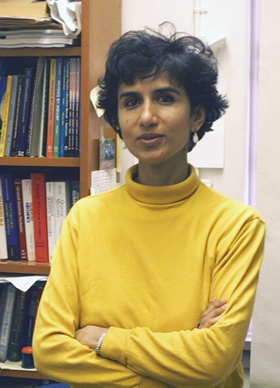Member Spotlight
Chandralekha Singh
University of Pittsburgh, Pittsburgh, PA
Personal Website
My Ph.D. is in theoretical condensed-matter physics. The odyssey that made me transition to physics education research (PER) and initially motivated me to attend the Physics Revitalization Conference in 1998 and AAPT in 1999 is perhaps familiar to others who have turned their attention to the learning process and its implication to teaching. As an instructor, I find helping students understand physical concepts highly rewarding. However, despite my best efforts, only a small fraction of my students appeared to have developed a good grasp of the concepts. I was fortunate to have the opportunity to be mentored by three cognitive scientists in Pittsburgh: Fred Reif, Bob Glaser, and Herb Simon. They helped me realize that, similar to medical research, research in the learning and teaching of physics can lead to the development of curricula and pedagogies to help students learn physics and develop their problem solving and reasoning skills. After attending my first AAPT meeting, I was completely hooked! Since then, I have only missed one National AAPT summer meeting and that was because I was too ill to attend!
When I started going to the AAPT meetings, I attended several workshops that helped me greatly. Later, I felt the desire to give back to the community. I have been conducting workshops on the implications of cognitive research to helping students learn physics, strategies to help women at all levels succeed in physics related professions, and on research-based tools for teaching quantum mechanics. I have benefited from many great sessions at both the national and regional AAPT meetings. I have also participated in many AAPT committees including having the opportunity to chair the Graduate Education and International Physics Education area committees. It has also been rewarding to attend many of the AAPT section meetings.
The most lasting impact of AAPT on my career has been through the wonderful colleagues I have met from all over the world who all share the same passion and enthusiasm for improving the teaching and learning of physics. I have learned so much from them. Since we have so much in common, they have inspired me in many ways, regardless of whether their focus is on teaching at the middle school, high school, or college level. The shared love of physics teaching and learning has made me close to many colleagues I see regularly at the AAPT meetings. The feeling of attending each meeting gives me the same joy that one gets from connecting with close relatives and friends! At each AAPT meeting, I not only have the pleasure of meeting with old friends, but also making new ones!
My research in PER aims to improve physics learning in both introductory and advanced courses. I realized early on that even advanced students taking junior/senior level quantum mechanics struggle to develop a coherent knowledge structure. I have been pursuing research related to advanced topics like quantum mechanics for almost two decades. I also carry out research to improve students’ problem solving and reasoning skills and develop tools for assessing student learning. I previously held the chair-line of the APS Forum on education, served as a guest editor of AJP for the Gordon Conference theme issue, chaired the editorial board for Phys. Rev. PER, and chaired a graduate education in physics conference. I served as the co-chair of the Gordon Conference on Physics Research and Education focusing on experimental research and labs in physics education and the first materials education conference. I also co-organized two physics education research conferences and co-edited the physics education research conference proceedings for three years. Currently, I am the founding Director of the Discipline-Based Science Education Research Center (dB-SERC) at the University of Pittsburgh, which helps faculty members in nine science departments apply the lessons of science education research to improve learning in their courses.
In addition to my research in PER, I am passionate about reducing the barriers and increasing the participation of women and other under-represented groups in physics. These traditionally under-represented groups face many implicit and explicit obstacles to their advancement. I am a team leader of the US delegation to the 6th International conference on Women in Physics in Birmingham, UK, next year. I dream of a world where everybody has the opportunity for good education, regardless of their background. I believe that education is the key to uprooting the pervasive and systemic inequity and ensuring that everyone has a chance to contribute to science, technology, and society.


